

Will Work For Free. Autonomy in Cars Progresses, But Regulators Struggle to Keep Up. The U.S.
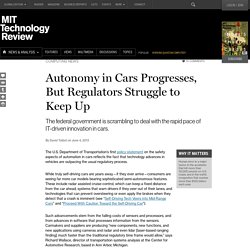
Department of Transportation’s first policy statement on the safety aspects of automation in cars reflects the fact that technology advances in vehicles are outpacing the usual regulatory process. While truly self-driving cars are years away—if they ever arrive—consumers are seeing far more car models bearing sophisticated semi-autonomous features. These include radar assisted cruise-control, which can keep a fixed distance from the car ahead; systems that warn drivers if they veer out of their lanes; and technologies that can prevent oversteering or even apply the brakes when they detect that a crash is imminent (see “Self-Driving Tech Veers into Mid-Range Cars” and “Proceed With Caution Toward the Self-Driving Car”).
Such advancements stem from the falling costs of sensors and processors, and from advances in software that processes information from the sensors. Rise of the Robots. Catherine Rampell and Nick Wingfield write about the growing evidence for “reshoring” of manufacturing to the United States.
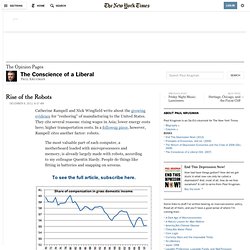
They cite several reasons: rising wages in Asia; lower energy costs here; higher transportation costs. In a followup piece, however, Rampell cites another factor: robots. The most valuable part of each computer, a motherboard loaded with microprocessors and memory, is already largely made with robots, according to my colleague Quentin Hardy. Welcome, Robot Overlords. Please Don't Fire Us? Illustrations by Roberto Parada This is a story about the future.

Not the unhappy future, the one where climate change turns the planet into a cinder or we all die in a global nuclear war. This is the happy version. It's the one where computers keep getting smarter and smarter, and clever engineers keep building better and better robots. By 2040, computers the size of a softball are as smart as human beings. The result is paradise. Maybe you think I'm pulling your leg here. But they're not. What do we do over the next few decades as robots become steadily more capable and steadily begin taking away all our jobs? Suppose it's 1940 and Lake Michigan has (somehow) been emptied. By 1950, you have added around a gallon of water. At this point it's been 30 years, and even though 16,000 gallons is a fair amount of water, it's nothing compared to the size of Lake Michigan. Better Than Human: Why Robots Will — And Must — Take Our Jobs. Imagine that 7 out of 10 working Americans got fired tomorrow.
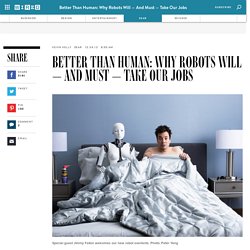
What would they all do? It’s hard to believe you’d have an economy at all if you gave pink slips to more than half the labor force. But that—in slow motion—is what the industrial revolution did to the workforce of the early 19th century. Two hundred years ago, 70 percent of American workers lived on the farm. The Rise of the Robots by Robert Skidelsky. Exit from comment view mode.
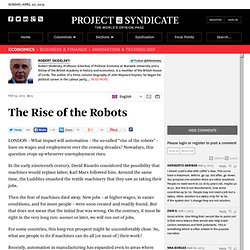
Click to hide this space LONDON – What impact will automation – the so-called “rise of the robots” – have on wages and employment over the coming decades? Nowadays, this question crops up whenever unemployment rises. In the early nineteenth century, David Ricardo considered the possibility that machines would replace labor; Karl Marx followed him. Around the same time, the Luddites smashed the textile machinery that they saw as taking their jobs. Then the fear of machines died away. Wired 8.04: Why the future doesn't need us. Why the future doesn't need us.

Our most powerful 21st-century technologies - robotics, genetic engineering, and nanotech - are threatening to make humans an endangered species. By Bill Joy From the moment I became involved in the creation of new technologies, their ethical dimensions have concerned me, but it was only in the autumn of 1998 that I became anxiously aware of how great are the dangers facing us in the 21st century. Wired 8.04: Why the future doesn't need us. The Rise of the Robots by Robert Skidelsky. Robotics, Cyborgs & Drones.
"Donnons des droits aux robots" Après avoir testé la cruauté des humains envers les robots, une chercheuse au MIT souhaite une protection juridique pour les robots sociaux, non pour eux-mêmes mais au bénéfice des humains.
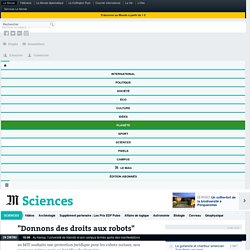
LE MONDE SCIENCE ET TECHNO | | Propos recueillis par Propos recueillis par Lucia Sillig ("Le Temps") Kate Darling n'aime pas torturer Pleo, un petit dinosaure robotique, mignon, du genre à n'avoir jamais fait de mal à une mouche. Pourtant, au cours de l'atelier que la chercheuse en propriété intellectuelle et en politique de l'innovation au Massachusetts Institute of Technology (MIT) de Boston organisait début février à Genève, lors de la conférence sur les nouvelles technologies Lift 13, elle a demandé aux participants de maltraiter la créature jusqu'à ce que mort s'ensuive. Le but était de sonder ensuite le ressenti de chacun. C'est du malaise provoqué chez elle par les mauvais traitements infligés au petit engin qu'est née sa réflexion sur le droit des robots. Lesquelles ? Et vous ? Comment cela ?